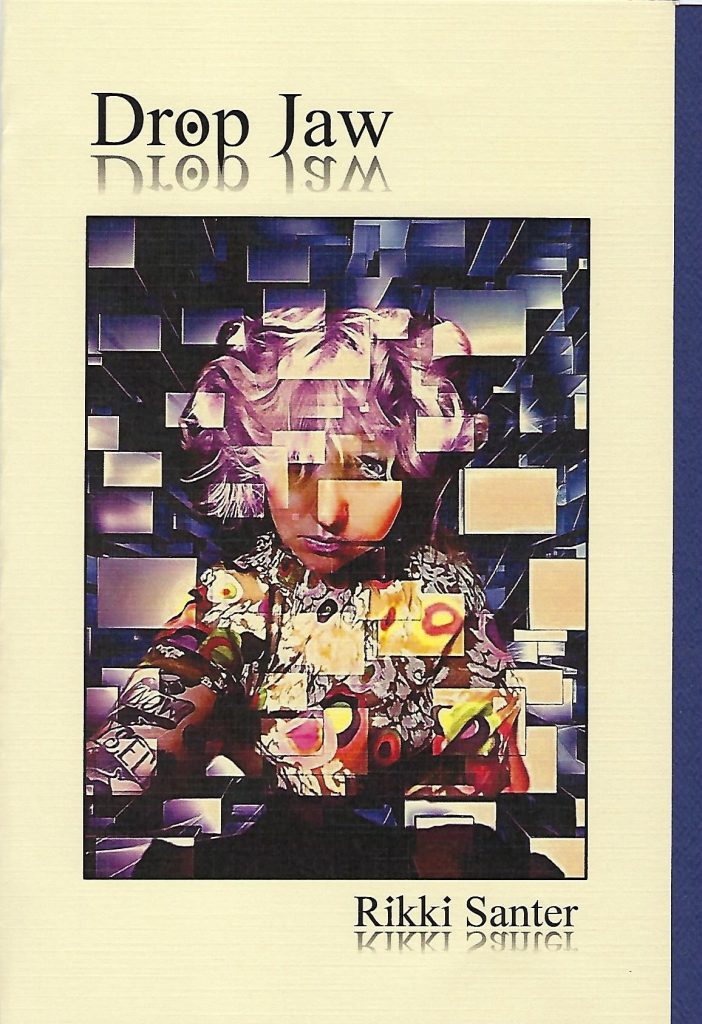
This book is like opening the back of a ventriloquist dummy to find a tiny universe. D E Zuccone, author of Vanishes
Rikki Santer’s Drop Jaw is a haunting homage to the carnivalesque world of ventriloquism, where the dummies are smarter than we think, expressing our hidden ids with “twisted talk / in twisted mouth.” Santer’s whimsical and whipsmart poems bring the secret history of dummies and their masters to life, imagining this craft as a lifelike mask for all we’d like to say, if we were brave enough to say it. Philip Metres, author of Shrapnel MapsP
Rikki Santer is that rarest of poets—someone more interested in the investigation of other lives than in meticulously documenting her own inner weather. She seems fascinated by the intimate minutiae of “ordinary history,” from her previous book on the decades-long presence of the Kahiki Supper Club in Columbus, Ohio, a dismantled cultural landmark that now lives on in her poems, to this new study, Drop Jaw, where like some kind of surrealistic sociologist, she lets us wander through the inner history of the ventriloquist’s world. As such, through this wild documentary tour— part historical record, but more often a verbal play on where voices come from—she becomes the poet of mirrored second-hand through the transformation of her language, where who is speaking is as much a mystery as where all those many thrown voices were coming from. Do they arise from lips that appear not to be moving at all, or from the poet herself, imagining the twisted avenues inside these dreams-out-of-time—as she puts it, a kind of “vaudeville language with wings”? Terry Hermsen, author of The River’s Daughter and A House for Last Year’s SummerT
Drop Jaw pursues the kind of space only the traveling voice occupies. These lines dutifully collide as concrete and illusion, a surprising arrangement of precise details and sound. Santer’s poems perform a trick within a trick: where craft is in complete control, each word plucked and placed on a tight wire. Here, carefully constructed imagery and diction inhabit oddities and a precarious politic—each rendering, an unknown and in between, like the dead air listening closely. Dionne Custer Edwards, poet, educator, creator of Pages at the Wexner Center for the Arts
In retrospect, I realize I was a bit of an odd child. While other boys my age played with G.I. Joe dolls and chemistry sets, I played with ventriloquist dolls and magic sets. While other kids favored Dr. Suess and Mother Goose, I preferred Eugene Field and Joyce Kilmer. Again, odd. As I grew older, my interests remained odd, at least by most societal standards. I eventually became a professional ventriloquist and magician while many of my contemporaries became soldiers and engineers. I suppose I’m still odd. I enjoy the offbeat—the unusual—the clever. So when I read Rikki Santer’s fascinating “takes” on our little ventriloquial community and its odd (to an outsider) denizens and activities, I was enthralled. She has managed to grasp something that few others have when experiencing our tiny, unusual world of ventriloquism. She has seen beyond the quirks—beyond the often ego-driven personalities—beyond the vaudevillian nature of what we do. She has seen that the odd in all of us is not so odd at all. In fact, it’s to be celebrated as an art that has lasted a long time. I’m confident you’ll enjoy these inside glimpses of who we are and what we do and sometimes…what we feel. Tom Ladshaw, award-winning magician, ventriloquist, esteemed ventriloquial historian and producer of the documentary, I’m No Dummy.
I love how Rikki brought her journalist curious self to the poems, and how they invited me to think much more deeply about this art of ventriloquism. Nancy Kangas, poet and educatorN
ISBN 978-1-64092-957-9
$12.00
Copies available from NightBallet Press, Amazon or from the author.